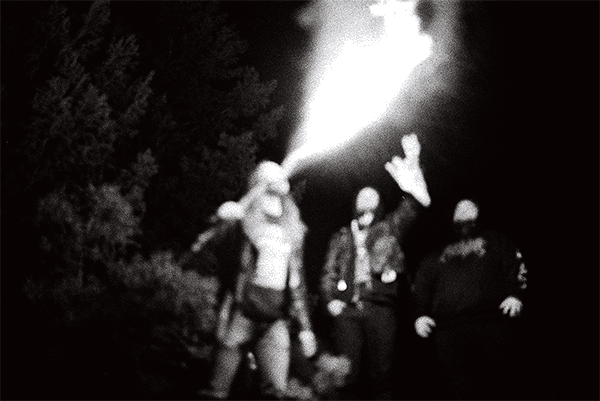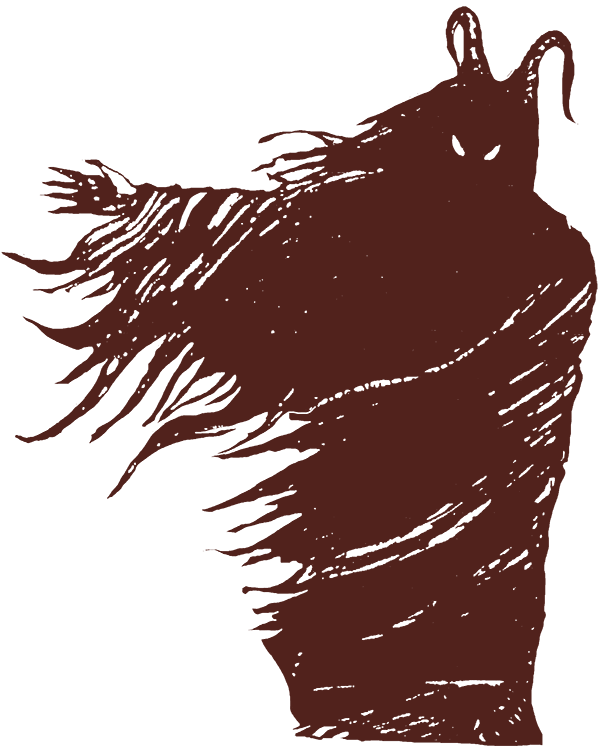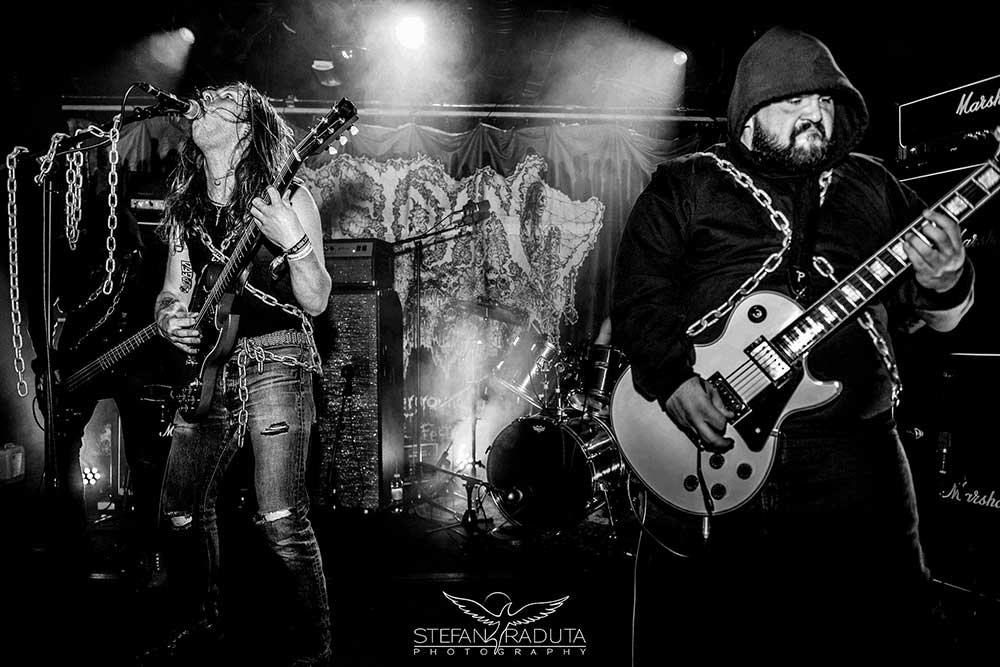Black Curse
2020-06-03
by Niklas Göransson
Costly illumination from the devouring fires – Eli and Zach of US black metal band Black Curse explain how lending one’s voice to the currents of chaos will invite them into all facets of life.
– “Endless Wound” was recorded in Cave Evil over the course of five days in January 2019, says Eli. We’d spoken a lot about production and atmosphere beforehand and decided to fly out Arthur Rizk to produce the endeavour. We knew him from various earlier encounters around bands and festivals, and it was clear from our very first conversation that we were on the same page. The material came together slowly and every song was reshaped, destroyed, trimmed from excess, and so forth until we were able to command the same energy each time we played them at rehearsal – Solve et Coagula. We felt as if this was something we had to capture in the studio, and Arthur did an absolutely fantastic job.
This ‘studio’, Cave Evil, is actually their friends’ house up in the mountains outside Denver. One of the first things that occurred to me was how the production combines depth and filth in a manner which suits the chaotic music splendidly. I therefore concluded that Mat, their host, must have some manner of semi-professional studio setup.
– Not the case at all actually, we used pretty limited gear during the recording. Arthur brought his laptop, a few mics, and various pieces of hardware; the rest was assembled from random accumulated gear we had lying around. Nothing fancy whatsoever. We also went to a guitar centre to buy some random odds and ends – and then returned them afterwards, which is a great little loophole if you’re ever in a pinch. Being in the right environment was crucial in terms of capturing the atmosphere we were after. There are no immediate neighbours, no cell-phone service, or any other distractions, so we were able to fully immerse ourselves in the task at hand.
The property has a huge barn with an upstairs serving as an art studio; this is where they set everything up for the recording. The result – the debut album of BLACK CURSE, “Endless Wound” – was released in April 2020 by Sepulchral Voice Records.
– Mat is a wonderful artist and the house is completely adorned with his own projects as well as those of his friends. Being surrounded by thousands of cassettes, skulls, medieval weapons, and drawings of caves and otherworldly beasts felt far more appropriate than being in a clean studio with headphone hooks and flatscreen TVs. We had no set hours to work within, so everything happened at a natural pacing whenever inspiration flowed. This also meant Arthur could push us further out of our comfort zones and bring out some truly incredible moments. For example, when it was time for vocals, everything was moved into a room of the house which has neither heat nor light; we began recording just before the witching hour.
– Yeah, adds Zach, recording in this place, far removed from the outside world, allowed us to get into the headspace required to make the album. Arthur was really into this as well. We all went crazy recording our parts, doing take after take just to capture a certain feeling. I remember waking up sore after tracking drums for two days, playing blastbeats for hours on end, but it was good to do this… we needed to push ourselves in every conceivable way. That even included having to think about simple things like drinking-water, which we had to be careful about since the water supply to Mat‘s place is irradiated and it was snowing for a large portion of our stay. All this created a unique environment; one that was key in capturing the material the way it comes across now.
Aiming to create a unique recording, they’d decided to make the most out of whatever meagre means they had at their disposal rather than entering some fancy studio. Zach says this decision was also taken with the album’s conceptual aspects in mind.
– When working with forces generally outside of your control – destruction, entropy, chaos, and so forth – and translating them into a musical language, it’s important to be in a place with the space for them to manifest. Getting ready to record, most of our practice sessions had all the energy and intensity of live shows; by the end of them, we’d be drenched in sweat and out of breath. We played those songs ‘til exhaustion and this really brought out the unhinged aspect. I could describe it as a high-speed train barrelling out of control, teetering on and off the tracks. The destructive elements of chaos play a large part of the band’s writing, concept, and approach. We wanted this conveyed in a way which also shines a light on those same forces’ ability to create, resurrect, and nourish. So many things go into the conceptual makeup of this band. For me, lyrically, no doubt a lot of it revolves around Goetia and theurgy, but I’m also pulling for the surrealists and the idea of unifying dream and reality. It can be seen as an effort to forge together images and concepts until they present both surprise and a new meaning. One plus one equals three: alchemy at its basest form. I think this has the potential to get at and reverberate with the greater universal myth that is the wellspring of all. Here, it’s done in a particular way that owes much debt to Lautréamont, Genet, Péret, Reverdy, Bataille, Breton, Huysmans, Camus, and, of course, Baudelaire.

You mentioned having also drawn from a few ‘influences outside the audibly obvious’?
– Yes, says Eli, I’ve always been into experimental and non-traditional music. My affinity for the extreme in music is geared towards pushing every element as far as possible while still maintaining the core sound of whatever framework one has chosen to work with. There’s no shortage of extremely tight and technically proficient guitar-playing in the music world but, at a certain point, sterility takes over and we end up listening only to musicians playing notes, having more in common with self-indulgence or masturbation than with creativity towards something greater than any single individual: the Art.
As examples of artists embodying this, Eli mentions the likes of English avant-garde guitar player Derek Bailey, Jojo Hiroshige of experimental Japanese noise ensemble HIJOKAIDAN, as well as Bill Orcutt – an American guitarist known for combining free improvisation with punk and blues.
– Orcutt is constantly changing tunings and removing strings to reveal obscure harmonics and tonal structures. Hiroshige‘s absolute destruction of the instrument, severing any ties to the traditional sounds thought to come from electric guitar, is incredibly engaging and inspiring to me. Bailey has a very percussive playing style – he uses the entirety of the instrument and interacts with it, rather than just playing the strings. These musicians are far more inventive and interesting than someone who’s learned how to move their fingers really fast in certain patterns. I could not give less of a fuck about people like Yngwie Malmsteen or any other ‘shredder’ rehashing the same conventions over and over again. Any thirteen-year-old can learn the muscle memory required for some scale or mode, but only artists can translate technique into an emotional language resonating with the listener on a deeper level. Improvisation has always intrigued me as an artist. Some of the most impactful riffs and moments on records have been birthed through instances of inspired improvisation, or by accident.
Where does improvisation come in for BLACK CURSE?
– All solos on “Endless Wound” and, to a certain degree, some of the playing within the structured riffs are improvised. My guitar playing technique is very visual; I don’t know any scales or notes or keys. Instead, I just try to focus on elements of the sonic landscape we immerse ourselves in through the ritual of music and then add accentuations and viscera. Considering our intentions as a band, I try to harness the sonic qualities of stabbing, strangulation, and scourges rather than dive bombs or fast picking. There’s an interview with the legendary krautrocker and sound artist Conrad Schnitzler where he talks about how he searches for music that flows ‘in and out of you’ – completely immersing you and then immediately leaving. This is something that’s always highly present in my musical thinking. I find that those are often the moments which make the most lasting impressions.

Whilst preparing for this conversation, I was made acutely aware of the complete lack of background information about BLACK CURSE available online. To my understanding, the band began playing in 2015 – first taking the name MALIBLIS, under which moniker they released a March 2017 promo tape.
– The band existed without a name for quite some time, says Eli. We went back and forth with different ideas and, ultimately, from some self-imposed pressure to decide on something, settled on MALIBLIS. It always felt like a placeholder in a way, and we’d periodically second-guess it. We completely scrapped the song on that promo and then I switched from bass to guitar; in that very moment, it was clear we’d crossed over into different territory and everything needed to be reconsidered. This changed a lot within the sound and general cadence of everything. As the material was constantly reworked – Solve et Coagula – we realised we needed a moniker which better reflected both the band’s content and context. The name BLACK CURSE had come up and been passed over before, in search of something more unique. I think it was during a rehearsal we came back to it with that ‘aha!’ moment. It represents the band’s philosophy and approach perfectly. In a way, the concept is an extension of what Zach had been working with in VASAELETH.
VASAELETH was a death metal duo founded in 2009. Besides their full length-album the following year, they released one demo and a number of EPs – two of which being splits with CRUCIAMENTUM and VORUM.
– We were exploring a current we both knew as a destructive and chaotic force, says Zach, one I had prior experience with. This force took on the name Vasaeleth to us and one of its aims was to spread itself like a disease, or a curse. We named it The Black Curse, which was a specific vein of chaos. The conceptualisation of what this was and what it could do is obviously hard to capture and nail down in just a few sentences, but we started providing images and sounds. That’s the connection between VASAELETH and BLACK CURSE – both work within that same specific current.
Can you elaborate a bit about this force?
– It goes back for quite some time with me personally. I’ve always been attracted to things that are stereotypically called ‘dark’, or things which tonally, verbally, sonically… whatever, have a hard or dark edge. As I grew into an adult, I began exploring these things more, which led me down many paths – including various occult studies and ritual practices, which has now been largely tempered into a more balanced approach. Pursuing those things, I came to know a presence, a force, that was and is highly chaotic and destructive. Some would say malignant, maybe evil. I look at it more like a fire that burns, generating heat and warmth but also devouring its fuel and creating ash and cinder.
This is where the seed of the idea behind the concept comes in – Zach says that, when left unchecked, this perceived evil force can affect one as a curse.
– It’s a metaphorical interpretation, of course, having much to do with the way that focusing on these things enters the subconscious mind and then leaks into one’s actual day-to-day life. That said, I’ve always been interested in working within this current because it’s wholly intriguing and allows one to express a side of the person that’s dark, chaotic, and destructive but, I argue, a thing that also needs to be explored and expressed. Just as fire burns, so also does it create light and shadow at the same time. This can, depending on intent, create balance and, ultimately, that’s what I’m striving for personally. But not with BLACK CURSE: the point of this expression is to present the chaos and destruction in a singular manner, on its own, largely unadorned. We’re trying to provide a direct line to this current, which is something I’ve tried to do with various other previous musical projects and that’s why the idea and concepts behind this band go back so far for me.
Eli adds that this has, in turn, led to difficulties with essentially every part of the process of making “Endless Wound”. And not only in the actual creation of the material, but also its live enactment.
– No matter how much preparation we put in, says Eli, every show we’ve played has had some sort of destructive element to it, incidents fully capable of erasing months of preparation in seconds. At our first show, in Denver, I was electrocuted seemingly at random whilst doing vocals, and there were pedals turning on and off. At Killtown in Copenhagen, I broke four strings and flung my power adapter into the audience. This past year, after we were done in Cave Evil, turned into one of the most stressful and tumultuous times of our personal lives. Relationships dissolved, housing security uprooted, financial crisis, family problems, etcetera. I don’t know if I want to go into too much detail here, as some of this is probably not great to talk about from a keeping-the-peace perspective, but it has impacted our lives as well as those we work with and the people around them.
So you believe this force to be stirring when you play?
– Well, says Zach, it is of tantamount importance to us to present a certain atmosphere while performing live. This means channelling the powers driving the material and, in effect, forcing them upon the audience. By its very nature, this means chaos and destruction. A number of friends have told me that they’ve had bad experiences after listening to the music, or have been almost stopped from making it to a show because of various problems coming up… I wouldn’t necessarily think much about this, but they are convinced that the curse is real and tell us about it rather than the other way around. I suppose we could dig into more detail here; Eli, can you remember anything that specific people have told us?
– A friend in Germany said that after wearing our shirt and playing the album for some friends before they went on stage brought about the worst performance of their two-decades-long career, with tons of technical malfunctions and bad playing – so much that the singer… or guitarist? I don’t remember which, quit the band or went missing for a few days. There was that photographer at Killtown who, immediately following our set, fell down an entire flight of stairs and injured his leg, damaged his camera, and destroyed all the photographs he’d just taken. Denis Forkas said our art commission was ‘truly the most stressful and mentally taxing project’ of his entire career. Thomas from Sepulchral Voice has had to deal with a whirlwind of shit and complications regarding this release, including insane delays and distribution problems.

Sepulchral Voice Records is a German underground operation founded in 2004 – Eli mentioned beforehand that they intentionally sought out SVR before even sending their demo recordings to any other labels.
– In a world of ‘content’ and endless self-promotion, there’s something to be said about a label existing for almost twenty years, with a limited – less than thirty releases – but highly potent output and that doesn’t need to constantly remind the digital sphere of its existence. I’ve always appreciated them for keeping a low profile, only rising from the ground to deliver deadly strikes of underground metal! Sepulchral Voice has curated their roster with bands who not only share exceedingly high standards musically, but also the conviction of ideology and aesthetics. While many bands on the label range vastly in sound and subject matter, there’s an intangible glue that binds them together and has helped carve out their place in the tradition of underground metal.
Besides BLACK CURSE, Sepulchral Voice works with bands as widely varied as NECROS CHRISTOS, REVEAL!, GRAVE MIASMA, VIRCOLAC, and DROWNED.
– We weren’t interested in signing with the biggest label with the deepest pockets or being another catalogue number sandwiched between twenty others that year. When the time came to think about labels, it was hardly a discussion. It felt as if being included in such a small but powerful roster would be a testament to the strength of the material – a stamp of quality, in a way. Thomas and Melle approach the label with a holistically sacred mentality, putting the music and art above all. SVR’s devotion and conviction reminds me of another label with a small roster who also took their name from a SODOM song…
So, what’s next for BLACK CURSE in this new quarantine reality of ours?
– Should things return to normal, we’ll make plans to play a few shows in support of the album – however, our real focus is on writing new material. The only thing we’ve had to cancel was a fest in Seattle this September, so we haven’t had any real disruptions like some other bands have had to deal with. Due to the intensity and atmosphere we seek from it, the live element will remain pretty selective. It’s not about saying yes to everything we get offered; we want to ensure each show is as strong as possible, so we’ll keep a low profile in that regard.



